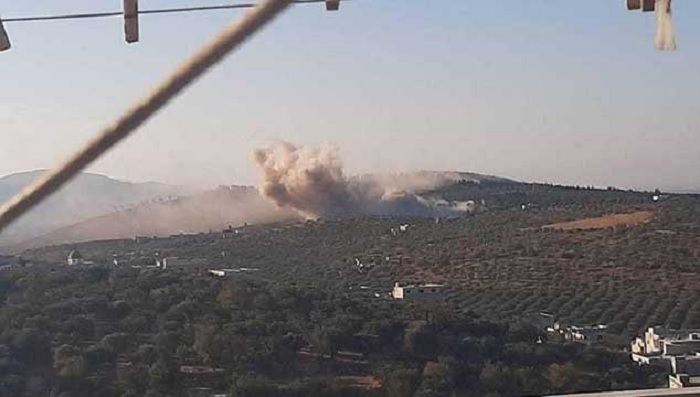
What is happening in the Caucasus region and the fierce clashes between the Armenian and Azerbaijani military. According to the latest information from Russian news agencies, Russian bombers struck powerful training camps at Syrian mercenaries.
According to local sources who share photos of the Russian strikes, the explosions were so powerful that they were seen tens of kilometers away. Military observers in the Idlib area say the bombings were consistent and lasted a total of 15 minutes. Analysts say that after such actions by any air force, the dead would be within 150-200 soldiers.
Russia’s ANNA news agency confirmed the news by posting photos of a Russian attack on training terrorist camps.
Analyzing the data from September 27 so far, BulgarianMilitary.com came to the conclusion that the Russian Air Force has bombed a total of three similar camps on the territory of Syria, directly related to the events in Nagorno-Karabakh. However, military experts claim that this is the first time that Russia has carried out such large-scale and powerful air strikes.
A number of experts say Russia has so far managed to kill about 400 Syrian mercenaries and terrorists heading for the events in Nagorno-Karabakh, at a time when they were in training camps.
The situation in Nagorno-Karabakh escalated on September 27, active clashes are taking place in the disputed territory. Martial law was introduced in Azerbaijan and Armenia, and mobilization was announced. Both sides reported killed and wounded, including civilians. In Baku, they announced the control of several Karabakh villages and strategic heights. Yerevan also reports about the shelling of the territory of Armenia.
Nagorno-Karabakh conflict
Azerbaijan and Armenia have been in conflict over Nagorno-Karabakh since February 1988, when the Nagorno-Karabakh Autonomous Region announced its withdrawal from the Azerbaijan SSR.
During the armed conflict in 1992-1994, the Azerbaijani side lost control of Nagorno-Karabakh and the seven areas adjacent to it. Since 1992, negotiations have been conducted within the framework of the OSCE Minsk Group on a peaceful settlement of the conflict. The group is led by co-chairs – Russia, USA and France.
In 1994, Azerbaijan, Armenia and the unrecognized Nagorno-Karabakh Republic, through the mediation of Russia, signed the Bishkek Armistice Protocol. At the same time, military operations did not stop there, which periodically renewed.
The most significant exacerbation of the conflict was the four-day war of 2016. Then hundreds of soldiers on both sides became victims.
Russian Foreign Minister Sergei Lavrov, during a meeting with the President of Azerbaijan last year, called for a rhetoric that would go against the fundamental principles endorsed by both sides and enshrined in the UN Charter and the Helsinki Final Act when resolving the situation around Nagorno-Karabakh.
At the same time, the head of the Russian Foreign Ministry admitted that much more needs to be done to achieve a long-term political settlement.
War in Syria
In February, Turkey lost at least 62 troops killed in Syria, nearly 100 soldiers were wounded, dozens of Turkish armored vehicles were destroyed and more than ten drones, including drone, were shot down. Washington has repeatedly accused Moscow of involvement in the deaths of Turkish soldiers, Russia rejects these allegations.
In early March, the presidents of Russia and Turkey, Vladimir Putin and Recep Tayyip Erdogan, concluded an agreement according to which a ceasefire came into force in the Idlib de-escalation zone.
Syrian President Bashar al-Assad later said that if the US and Turkish military did not leave the country, Damascus would be able to use force.
The reason for the Russian-Turkish negotiations was a sharp aggravation of the situation in Idlib, where in January a large-scale offensive by the Syrian army against the positions of the armed opposition and terrorists began.
Government forces recaptured nearly half of the Idlib de-escalation zone and left behind a number of Turkish observation posts. After that, Ankara sharply increased its military contingent in the region and launched the operation “Spring Shield” to push the Syrian troops. Turkey is also supported by militants loyal to it.
 Eurasia Press & News
Eurasia Press & News



